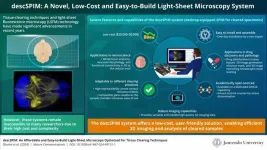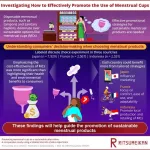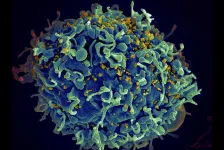(Press-News.org) Washington, D.C.—Researchers have detected anaerobic and aerobic bacteria in commercial tattoo and permanent makeup inks. The findings, reported in Applied and Environmental Microbiology, a journal of the American Society for Microbiology, demonstrate that the inks could be a source of human infections. The new study is particularly notable as it is the first to investigate the presence of anaerobic bacteria in commercial tattoo inks.
“Our findings reveal that unopened and sealed tattoo inks can harbor anaerobic bacteria, known to thrive in low-oxygen environments like the dermal layer of the skin, alongside aerobic bacteria,” said corresponding author Seong-Jae (Peter) Kim, Ph.D., a microbiologist with the Division of Microbiology, National Center for Toxicological Research, U.S. Food and Drug Administration, Jefferson, Ark. “This suggests that contaminated tattoo inks could be a source of infection from both types of bacteria. The results emphasize the importance of monitoring these products for both aerobic and anaerobic bacteria, including possibly pathogenic microorganisms.”
The main goal of the new study was to assess the prevalence of both aerobic and anaerobic microbial contaminants in tattoo inks available on the U.S. market. For the detection of aerobic bacteria, the researchers mixed 1 to 2 grams of tattoo ink solution with appropriate media and incubated them in a standard incubator, and to detect anaerobic bacteria, they mixed the ink solution with appropriate media and incubated them in an anaerobic chamber, a device specifically designed to cultivate anaerobes. This chamber is kept oxygen-free by constant flushing with a mix of gases such as nitrogen, carbon dioxide and hydrogen. The researchers conducted this procedure for a total of 75 tattoo inks from 14 different manufacturers.
The investigators discovered that around 35% of tattoo or permanent makeup inks sold in the U.S. were found to be contaminated with bacteria. “Both types of bacteria, those needing oxygen (aerobic) and those not needing oxygen (anaerobic), can contaminate the inks,” Kim said. “There was no clear link between a product label claiming sterility and the actual absence of bacterial contamination.”
“The rising popularity of tattooing in recent years has coincided with an increase in tattoo-related complications or adverse reactions,” Kim said. “It should be noted that microbial infections constitute just one aspect of these complications. In addition to microbial infections, immunologic complications such as inflammatory reactions and allergic hypersensitivity, as well as toxic responses, represent a significant portion of these issues. In light of our study results, we want to emphasize the importance of continuously monitoring these products to ensure the microbial safety of tattoo inks.”
Kim and his colleagues will move their research forward in 2 key directions. They will develop more efficient microbial detection methods for tattoo inks, making the process quicker, more accurate and less labor-intensive. They will also conduct systematic research to deepen the understanding of microbial contamination in tattoo and permanent makeup inks. This will include studying the occurrence, co-occurrence and diversity of microbial contaminants, which is essential for preventing contamination in these products.
###
The American Society for Microbiology is one of the largest professional societies dedicated to the life sciences and is composed of 32,000 scientists and health practitioners. ASM's mission is to promote and advance the microbial sciences.
ASM advances the microbial sciences through conferences, publications, certifications, educational opportunities and advocacy efforts. It enhances laboratory capacity around the globe through training and resources. It provides a network for scientists in academia, industry and clinical settings. Additionally, ASM promotes a deeper understanding of the microbial sciences to diverse audiences.
END
Bacteria detected in tattoo and permanent makeup inks
2024-07-02
ELSE PRESS RELEASES FROM THIS DATE:
American Indian/Alaska Native patients less likely to undergo breast reconstruction
2024-07-02
Waltham — July 2, 2024 — American Indian/Alaska Native (AI/AN) women with breast cancer have consistently lower rates of breast reconstruction after mastectomy compared to non-Hispanic White women, reports a paper in the July issue of Plastic and Reconstructive Surgery®, the official medical journal of the American Society of Plastic Surgeons (ASPS). The journal is published in the Lippincott portfolio by Wolters Kluwer.
"Despite an upward trend in reconstruction, AI/AN women continue to be less likely to undergo breast reconstruction," comments Jane Hui, MD, MS, ...
Prosocial influencers can promote societal cooperation
2024-07-02
A modeling study suggests that influential neighbors can be as effective as despotic leaders at promoting social cooperation. Prosocial behaviors can be difficult to sustain in large societies over the long term, as people give into the temptation to defect to strategies that prioritize the wellbeing of themselves and their immediate family. Stefani Crabtree and colleagues constructed a general theoretical framework to explore how cooperation could arise and be maintained in a large society. The authors explore three possible ...
SRF launches the SYNGAP1 missense account with Nordmoe family donation
2024-07-02
Mill Valley, CA – June 18, 2024 SRF has established a dedicated account to support research regarding SYNGAP1 missense variants. This account is being launched with a $10,000 donation from Dennis and Janet Nordmoe. This is a cause close to their hearts, as their granddaughter Olivia was diagnosed with SYNGAP1-Related Disorder (SRD) caused by a missense variant earlier this year.
Missense Research: Neglected to Date
“Most diagnosed SYNGAP1-Related Disorder (SRD) patients have protein truncating variants (PTV) as opposed to missense variants. Virtually all PTVs are assumed to have the ...
Design and development of a novel light sheet fluorescence microscope
2024-07-02
Three-dimensional (3D) imaging of organs and tissues is vital as it can provide important structural information at the cellular level. 3D imaging enables the accurate visualization of tissues and also helps in the identification of pathological conditions. However, achieving successful 3D imaging necessitates specific prerequisites, including the preparation of 'cleared' tissue samples—biological specimens rendered transparent by removing light-scattering components like lipids to ...
How to promote menstrual cups as an economic and sustainable option
2024-07-02
In recent decades, single-use plastics have pervaded modern societies, causing a significant surge in plastic pollution that exacts a heavy toll on our environment. Addressing this issue requires prioritizing sustainable alternatives to single-use plastics wherever feasible.
Disposable menstrual products are a notable contributor to plastic waste, with billions of sanitary napkins and tampons being discarded every year. Despite the availability of sustainable options like menstrual cups (MCs), consumer preference for single-use products ...
Spotted apex predator being pressured by spotted pack hunters – and it's our fault
2024-07-02
Who’s stronger? A solitary leopard or cackle of hyenas? And which is best at getting along with humans?
University of Copenhagen researchers closely studied this in a large East African natural area surrounded by rural settlements. The study demonstrates that the presence of humans has a direct impact on the competitive relationship between the two large predator species: leopards (Panthera pardus) – the iconic spotted feline and the spotted hyena (Crocuta crocuta) – a kleptoparasite and pack hunter known for its comical ...
True scale of carbon impact from long-distance travel revealed
2024-07-02
The reality of the climate impact of long-distance passenger travel has been revealed in new research from the University of Leeds.
Despite only accounting for less than 3% of all trips by UK residents, journeys of more than 50 miles (one way) are responsible for 70% of all passenger travel-related carbon emissions.
The disparity is even greater when international travel is singled-out: international journeys are only 0.4% of total trips but are responsible for 55% of emissions.
The new research, published today in the journal Nature Energy, also shows ...
Cutting-edge genomic test can improve care of children with cancer
2024-07-02
Whole genome sequencing has improved clinical care of some children with cancer in England by informing individual patient care.
New research from the Wellcome Sanger Institute, Cambridge University Hospitals NHS Trust, Great Ormond Street Hospital, and the University of Cambridge, supports the efforts to provide genome sequencing to all children with cancer and shows how it can improve the management of care in real-time, providing more benefits than all current tests combined.
The study, published today (2 July) in Nature Medicine, ...
Drugs that kill "zombie" cells may benefit some older women, but not all, Mayo Clinic study finds
2024-07-02
ROCHESTER, Minn. — Drugs that selectively kill senescent cells may benefit otherwise healthy older women but are not a "one-size-fits-all" remedy, Mayo Clinic researchers have found. Specifically, these drugs may only benefit people with a high number of senescent cells, according to findings publishing July 2 in Nature Medicine.
Senescent cells are malfunctioning cells in the body that lapse into a state of dormancy. These cells, also known as "zombie cells," can't divide but can drive chronic inflammation and tissue dysfunction linked to aging and chronic ...
New lab test to detect persistent HIV strains in Africa may aid search for cure
2024-07-02
New Lab Test to Detect Persistent HIV Strains in Africa May Aid Search for Cure
A multinational team led by Weill Cornell Medicine investigators developed a test that will help measure the persistence of HIV in people affected by viral strains found predominantly in Africa—a vital tool in the search for an HIV cure that will benefit patients around the world.
The study, published in Nature Communications on July 2, helps fill a major gap in human immunodeficiency virus (HIV) research. Most HIV studies have focused on strains circulating in Western countries, predominantly ...




